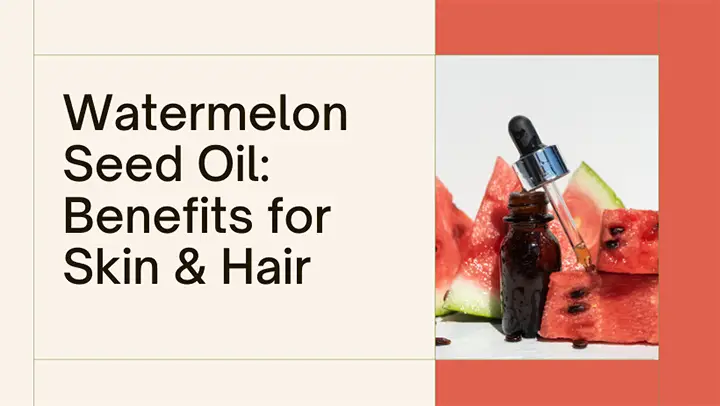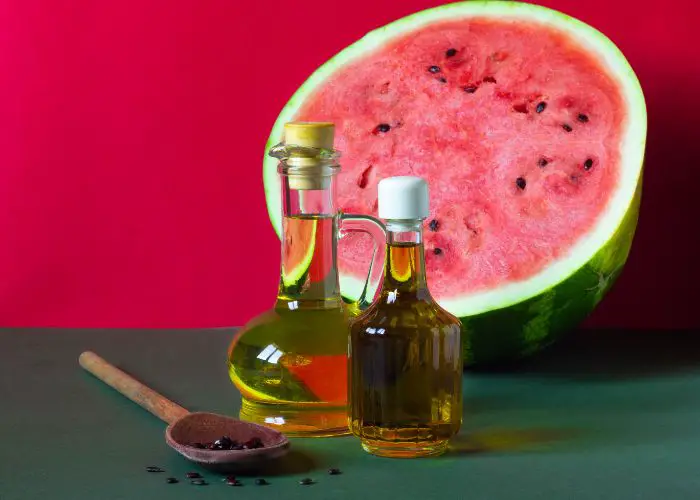
In today’s world, people are increasingly mindful of what they put on their skin and hair. It’s no surprise that there’s a growing interest in natural oils packed with health-enhancing benefits within the cosmetic industry.
Enter rare oils like watermelon seed oil, which are gaining popularity as standout ingredients in cosmetic products. Known for its antioxidant, moisture retention properties, and light texture, watermelon seed oil is a top pick for skin and hair care formulations.
In this article, we look at all the benefits of this powerhouse ingredient and how to add it to your skin and hair care routines.
Table of Contents
- What is Watermelon seed oil?
- The Composition and Properties of Watermelon Seed Oil
- Benefits of Watermelon Seed oil for the Skin
- Benefits of Watermelon Seed Oil for Hair
- How to Use Watermelon Seed Oil
- FAQs
What is Watermelon seed oil?
Watermelon seed oil originates from the southern parts of Africa (Kalahari desert area). From there, it was exported to other parts of Asia, Europe, and North America. It is commonly known in Africa as Ootanga or Kalahari seed oil and has been used for its medicinal properties for over 5000 years.
The oil is extracted through the cold press of the watermelon seeds after these have been dried. It has a light yellow colour and a slightly nutty scent. It is generally available in its refined form that can sometimes be odourless.
There are typically two varieties of watermelon seed oils used in the cosmetics industry; Citrullus lanatus seed oil and Citrullus vulgaris.
The former is obtained from wild watermelons grown in southern Africa (also called Kalahari melon), while the latter is obtained from the common red and green watermelons found globally. Both share similar properties and benefits for the skin and hair.
The Composition and Properties of Watermelon Seed Oil
Watermelon seed oil comes with many properties beneficial not only for the skin but also for hair:
- Moisturizing: Thanks to linoleic (51%), oleic (36%), stearic (5%), and palmitic acids (6%), it helps maintain skin hydration and strengthen the skin’s barrier.
- Antioxidant: Rich in vitamin E and other phenolic compounds, it shields the skin from oxidative stress and helps to regenerate skin cells by stimulating the production of collagen. It also contains traces of vitamin A, another antioxidant beneficial for skin.
- Anti-inflammatory: Tocopherols, a form of vitamin E, work alongside fatty acids in watermelon seed oil to reduce inflammation and soothe irritated skin, offering natural relief and support for skin health.

Benefits of Watermelon Seed oil for the Skin
When it comes to the skin, watermelon seed oil has the following benefits :
Moisturizer for all skin types
Watermelon seed oil is a flexible moisturizer that works well for all skin types, matching everyone’s needs.
- Dry skin: Rich in fatty acids, watermelon seed oil deeply hydrates and repairs the skin’s moisture barrier. It’s especially beneficial for soothing and rejuvenating dry or dehydrated skin.
- Oily skin: It contains linoleic acid that helps balance oil production. Its lightweight texture absorbs quickly without blocking pores.
- Sensitive or ageing skin: Rich in vitamin E and linoleic acid, watermelon seed oil acts as a gentle moisturizer. It helps calm irritation and is kind to delicate skin types.
Anti-ageing effect
Watermelon seed oil’s blend of vitamins A and E, along with linoleic acid, fights against the signs of aging by protecting the skin from sun damage and promoting elasticity. These nutrients work together to prevent premature aging and can be combined with collagen-boosting ingredients for firmer skin.
Evens the skin tone
Watermelon seed oil, with its blend of vitamins and fatty acids, plays a key role in promoting an even skin tone. While it contains trace amounts of vitamin A, known for its ability to help with hyperpigmentation, the oil’s rich vitamin E content is a standout for its antioxidant properties.
Vitamin E not only helps improve blood circulation, which can reduce dark circles under the eyes, but also protects the skin from environmental damage that can lead to uneven skin tone. Additionally, the linoleic acid in watermelon seed oil helps to strengthen the skin’s barrier, keeping it hydrated and healthy, which is essential for maintaining an even complexion.
Non-comedogenic
With a comedogenic rating of 0-1, the watermelon seed oil is unlikely to clog pores and is suitable for all skin types. It quickly gets absorbed by the skin leaving a non-greasy feeling once applied. This oil is well suited to acne-prone skin.
Anti-acne
One of the problems people suffering from acne face is an unbalanced moisture barrier. Dr. Zeichner, MD, a New York-based dermatology, explains that:
“Linoleic acid is produced at lower-than-normal levels in patients who have acne, so using watermelon seed oil can help restore an abnormal and inflamed skin barrier in acne patients.” This is made possible due to the action of linoleic acid deep in the skin. It gets rid of dead skin cells and other impurities, as well as excess sebum accumulated in the pores.
Does watermelon seed oil offer any benefits for lips?
Yes, watermelon seed oil is great for lips. It moisturizes, heals, and smooths dry, chapped lips thanks to its moisturizing and antioxidant properties. When used in lip balms or oils, especially with added ingredients like hyaluronic acid, it boosts hydration, making it perfect for preventing flakiness in cold weather.
Benefits of Watermelon Seed Oil for Hair
Watermelon seed oil also has several benefits for hair. These are as follows:
Promotes blood circulation on the scalp
Watermelon seed oil, loaded with antioxidants, not only supports the regeneration of skin cells but also enhances blood circulation in the scalp. This improved circulation stimulates cell growth, helping to prevent hair loss effectively.
Boosts hair growth
Watermelon seed oil, containing copper, supports melanin production to maintain hair color and potassium to promote cell generation for healthier hair growth. Its fatty acids also deeply moisturize the hair and scalp, reducing breakage.
Emollient benefits
The oleic and palmitic acids in watermelon seed oil provide emollient benefits, locking moisture into hair strands for extended hydration. Its lightweight texture ensures easy absorption by the scalp, avoiding clogged hair follicles and buildup. Furthermore, it enhances hair elasticity by stimulating collagen production.
How to Use Watermelon Seed Oil
Understanding how to incorporate watermelon seed oil into your beauty regimen can significantly enhance your skin’s health.
Universal Application: Watermelon seed oil is versatile. Start with a few drops as a moisturizer, serum, or cleanser, adjusting the amount based on your skin’s needs. Suitable for day or night use, its adaptability makes it perfect for all skin types.
Combatting Acne
If acne is a concern, watermelon seed oil can be a valuable addition to your skincare routine in several ways:
- As a Serum: Apply directly after cleansing and toning to help soothe and treat acne-prone skin.
- As a Moisturizer: Its lightweight nature means it moisturizes without leaving your skin greasy.
- Carrier Oil: Mix it with essential oils to create a targeted treatment for your face.
- Overnight Mask: Combine with rosehip oil for a potent overnight mask that nourishes deeply.
- Cleanser: In soap form, it’s an effective start to your skincare routine, especially noted in Indian beauty practices.
- Double Cleansing: Use it before your cleanser or with your makeup remover to dissolve excess sebum and dirt, helping to unclog pores and leave skin clean.
For hair growth
Watermelon seed oil, rich in phytonutrients, is a powerhouse for promoting hair growth. Here’s how to incorporate it into your hair care regimen:
- Scalp Treatment: Directly massage the oil into your scalp, either alone or mixed with jojoba oil for added nourishment. The antioxidants and amino acids in watermelon seed oil stimulate blood circulation, creating an optimal environment for hair growth.
- Pre-Shampoo Treatment: Warm the oil slightly and apply it to damp hair, leaving it in for about 30 minutes before rinsing. This method primes your scalp and hair for the cleansing process.
- In Hair Masks: Incorporate watermelon seed oil into your hair masks for an extra boost of hydration and nutrients. Alternatively, use it as a regular hair oil to smooth, moisturize, and support hair strength and growth.
FAQs
What is the shelf life of watermelon seed oil?
When properly stored, pure watermelon seed oil has a shelf life of 2 years. It should be stored someplace cool, dark, and dry.
Can watermelon seed oil be used on pregnant women?
No data suggest that this oil cannot be applied during pregnancy. Although, if pregnant, you should refer to your doctor first before use. However, it’s used as an ingredient in many belly oils to keep the skin on the belly bump healthy. It is also an ingredient in baby oil formulations which is a good sign that this is a quite safe oil to use when pregnant.
Watermelon seed oil vs. rosehip oil: what is the difference?
Both oils strong anti-ageing powerhouses but watermelon seed oil has a slightly lower amount of linoleic acid (51%) than rosehip oil (54%). The watermelon seed oil contains more vitamin E (95% tocopherols) than rosehip oil. While rosehip oil is more suitable for oily and acne-prone skin, the watermelon seed oil is suitable for all skin types.
Is Kalahari melon seed oil different from watermelon seed oil?
The watermelon is a variety of the Kalahari melon. It is grown globally and has a sweet taste. The Kalahari melon, on the other hand, is considered a wild plant. Its fruit has a bitter taste. It can only be found only in the southern parts of Africa around the Kalahari desert.
Both oils have the same fatty acid profiles and contain the same minerals and vitamins. Although, the Kalahari seed oil may have all of those in slightly higher percentages.

Petra Nakashian (previously Kravos) is a dedicated natural health and beauty blogger, driven by the loss of her parents to cancer, which led her to meticulously research beauty product ingredients. With over 10 years of experience, her in-depth knowledge has made her a trusted expert in the field. Founder of Be Healthy Now and Green Beauty Talk, Petra recently expanded her expertise with Beauty Insights Hub, exploring a wider range of beauty treatments. Committed to transparency and honesty, her work is a vital resource for navigating the complex world of beauty.

